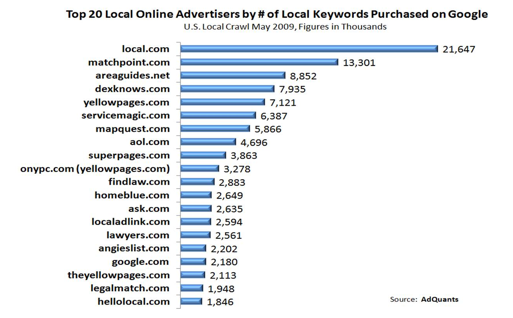AdQuants: Top Local Search Advertisers Are Traffic Resellers
Analytics firm AdQuants has compiled some very interesting data on the local search market. It’s based on the company’s crawling of the major search engines in “250 US metros with approximately 300 local keywords spanning the spectrum of local service providers and retailers.” AdQuants found that national paid search market share trends were magnified at […]
Analytics firm AdQuants has compiled some very interesting data on the local search market. It’s based on the company’s crawling of the major search engines in “250 US metros with approximately 300 local keywords spanning the spectrum of local service providers and retailers.” AdQuants found that national paid search market share trends were magnified at the local level: “Of the 86,000 Local Online Advertisers identified, 83% advertised on Google, 33% advertised on Yahoo and only 8% advertised on Microsoft, significantly below Microsoft’s 12% share at the national level.”
There’s no breakdown offered regarding the small business vs. franchise or national-local advertiser percentages in the data. However, among the top 20 local online advertisers identified in the AdQuants Q1 paid keywords crawl, most are all directories or search engines of one sort or another that resell search traffic to small business customers:

As the top local search advertiser, Local.com was advertising against 21,000 local keywords according to AdQuants. AdQuants also reported that among local/geo-targeted advertisers on Google it found that approximately 30 percent of those SEM campaigns were being managed by third parties. Here’s the breakdown:
The AdQuants data doesn’t capture 100 percent of what’s going on in the local marketplace; however, it’s a highly representative snapshot. What we see here is the ecosystem laid bare: directories with local “feet on the street” and local search engines buying search traffic and local keywords from Google, Yahoo and Microsoft and then reselling that traffic to small businesses, which are otherwise mostly unable to manage those campaigns themselves.
After several years of experiments Google essentially recognized the need to develop sales channel and reseller partnerships with companies that had more direct reach into the small business market. (Yahoo and Microsoft also have these partnerships to a lesser degree.) The ecosystem reflected above was not engineered by Google; it emerged largely “organically” in response to the needs of publishers and small businesses, which didn’t have the time or inclination to master AdWords themselves.
Contributing authors are invited to create content for Search Engine Land and are chosen for their expertise and contribution to the search community. Our contributors work under the oversight of the editorial staff and contributions are checked for quality and relevance to our readers. The opinions they express are their own.
Related stories
New on Search Engine Land
